
Raw milk: regulatory loophole gives Swiss the freedom to skip pasteurisation
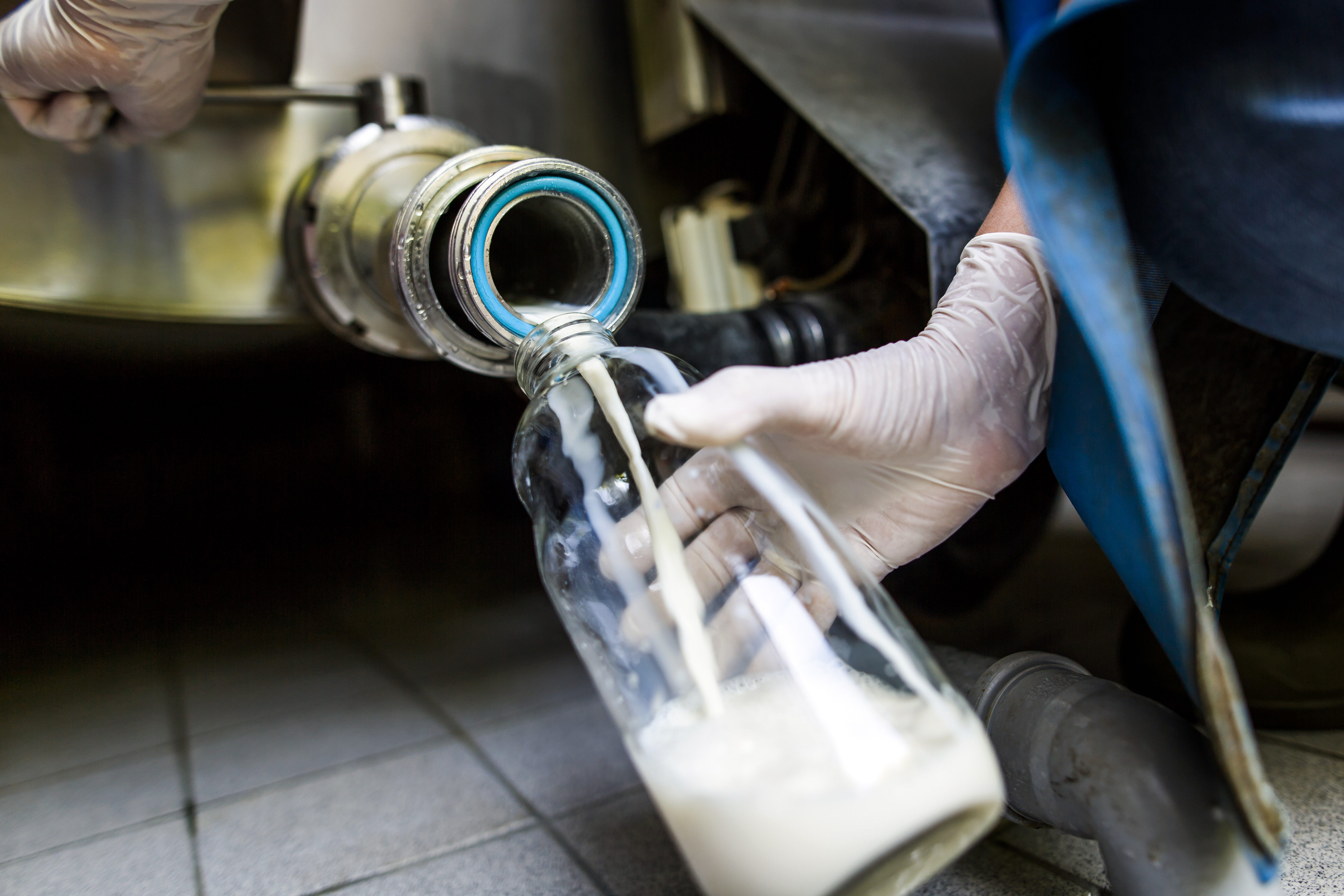
Once considered dangerous, raw milk is now back in people’s fridges. Legislation worldwide is adapting. Switzerland relies on labelling and personal responsibility.
It took 16 years for Jason Schultz, a Republican politician, to pass a bill he introduced to allow the American state of Iowa to legalise the sale of raw or unpasteurised milk. When he won his seat in the Iowa House of Representatives in 2008, Schultz didn’t expect much resistance considering that Iowa is an agrarian Midwestern state known for corn and pigs; the Iowa State Fair even features a 600-pound cow made entirely out of butter.
“I thought this would be easy,” Shultz, now an Iowa state senator, told SWI swissinfo.ch by email.
However, he was unable to get his bill passed until last May when the Republicans controlled the legislature and Republican Governor Kim Reynolds signed the raw milk bill into law. As of July 1, 2023, Iowan farmers are allowed to sell raw milk directly to consumers. Resistance came from public health bodies and big dairy groups on the grounds that raw milk was a danger to public health as it could contain harmful pathogens.
“All I wanted was for Iowans who sought access to fresh milk to not fear government or corporate intrusion into their actions. We finally accomplished that,” says Schultz.
Iowa joins the growing majority American states that allow the sale of raw milk. But gaining access to raw milk is more complex than just living in a state that doesn’t ban it. Of the 30 states that allow its sale, 17 only allow direct sales from farms. Twenty states ban the direct sale of raw milk but eight of these allow “herd-share” agreements where buyers own a stake in a cow herd and can obtain milk for personal consumption. To further complicate matters, federal law does not allow the transport of raw milk across state borders.
Like the US, legislation on the sale of raw milk, where it exists, varies across the world. Australia, Canada, China and Scotland prohibit it while in most of Europe and Japan it can be sold by farms that meet certain hygiene standards and agree to be subjected to random checks. Brazil has banned the sale of raw milk except in remote areas that lack access to a steady supplyExternal link of pasteurized milk.
In Switzerland in theory the sale of raw milk is illegal but can be sold under certain conditions. Swiss food regulations do not allow raw milk to be advertised or sold for direct consumption. All milk sold in Switzerland has to be pasteurised where it is heated to at least 72°C (161°F) for 15 seconds and then rapidly cooled. However, the Alpine nation still has about 400 raw milk vending machines operated by farms scattered across the country.
“In Switzerland, raw milk is not considered ready for consumption and can only be supplied to consumers if they are informed of the shelf life, storage conditions and correct heating,” a spokesperson of the Swiss federal Food Safety and Veterinary Office responded by email.
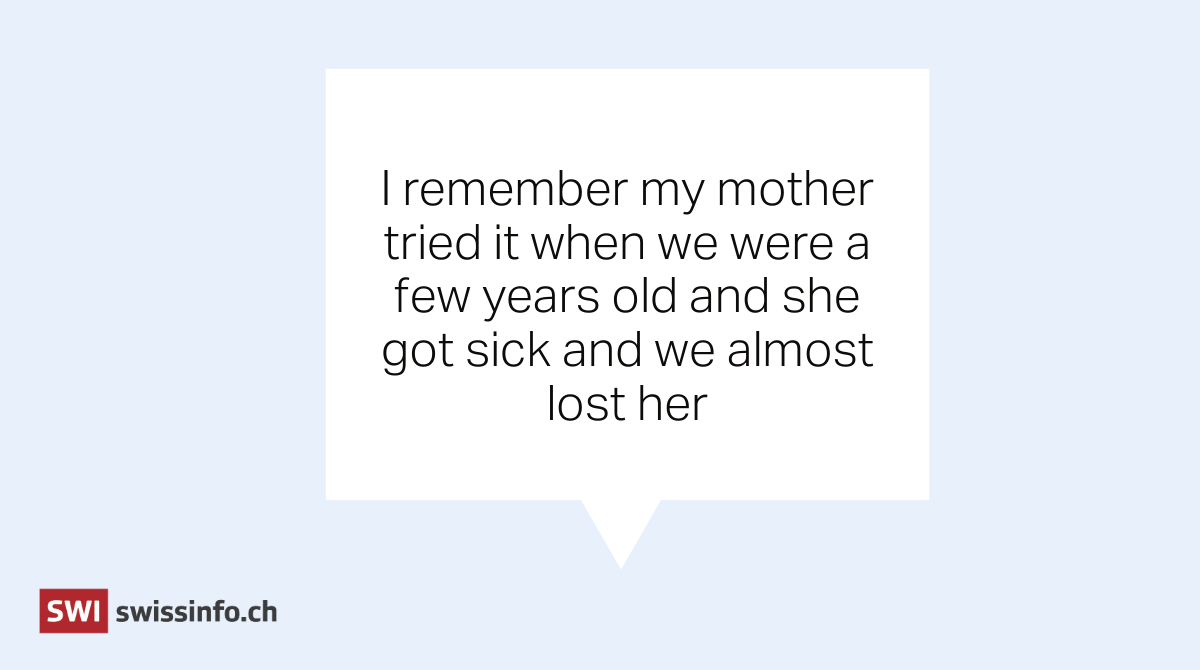
Thus, Swiss dairy farmers comply with the regulations by sticking a label on the vending machines that warns buyers that they must heat the milk. Whether they do so or not, is not the farmer’s responsibility.
“A clear declaration is required for the open sale of raw milk or for vending machines. The responsibility then lies with the consumer (self-responsibility). There have hardly been any problems with this regulation to date,” says Thomas Reinhard, head of projects and support at Swissmilk, the association of Swiss milk producers.
Plastic cups placed next to a raw milk vending machine near the capital Bern visited by SWI swissinfo.ch indicate that some consumers drink the milk raw on the spot without bringing it home to heat it as required.
Swiss dairy farmers do not make a killing from the sale of raw milk but it helps diversify their business.
“The raw milk vending machine is quite expensive to buy. Selling raw milk is not very profitable but I cover my costs. It is more a service for my clients than a profit maker,” says Nicolas Pellaud who runs a dairy and artisanal cheese business in the ski resort village of Nendaz in western Switzerland.
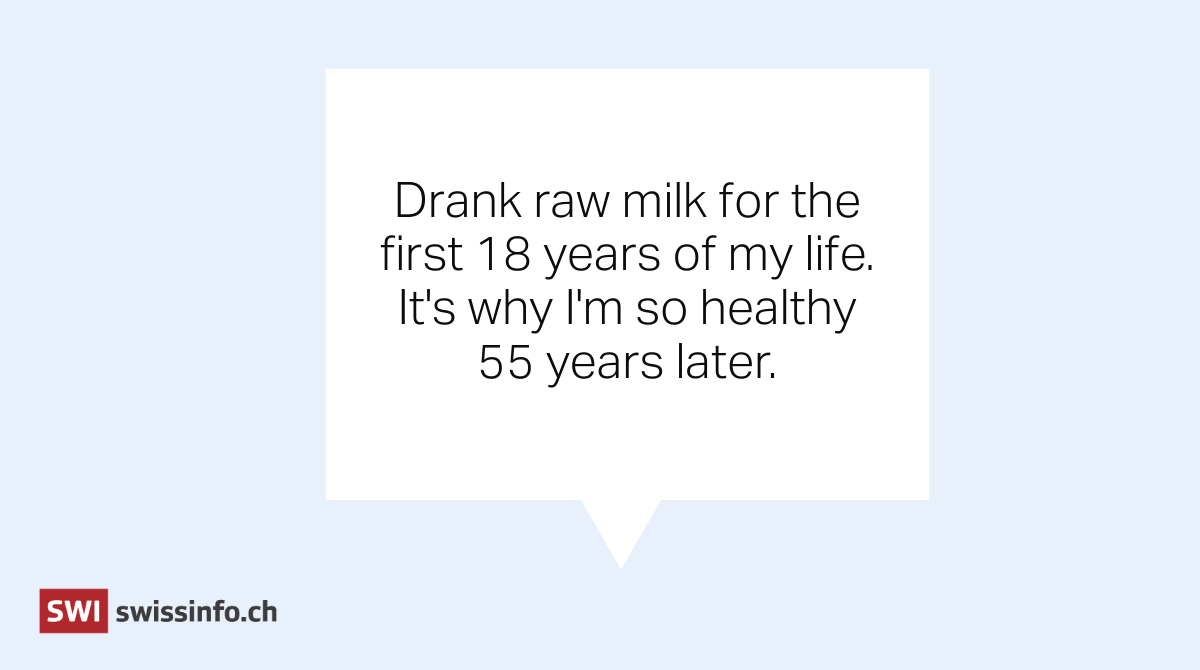
Like Pellaud, Esther Mottier also claims that her main motivation is the desire to meet a specific demand from customers and not financial considerations. The raw milk vending machine next to her organic shop in Château-d’Œx serves a niche group of aficionados who have dietary intolerances or who prefer milk from cows with horns.
“The sale of raw milk through a vending machine does indeed offer a better price per litre than selling to wholesalers or retailers. However, the quantities sold are very limited and do not constitute a sufficient volume to make this activity truly lucrative,” she says.
Legislation around raw milk is part of a bigger debate about health benefits and risks associated with consuming raw milk. Four years ago, the Swiss agriculture research institute Agroscope conducted a study on the health benefits of raw milkExternal link and concluded that raw milk and derived products have a positive effect on gut microbiome diversity.
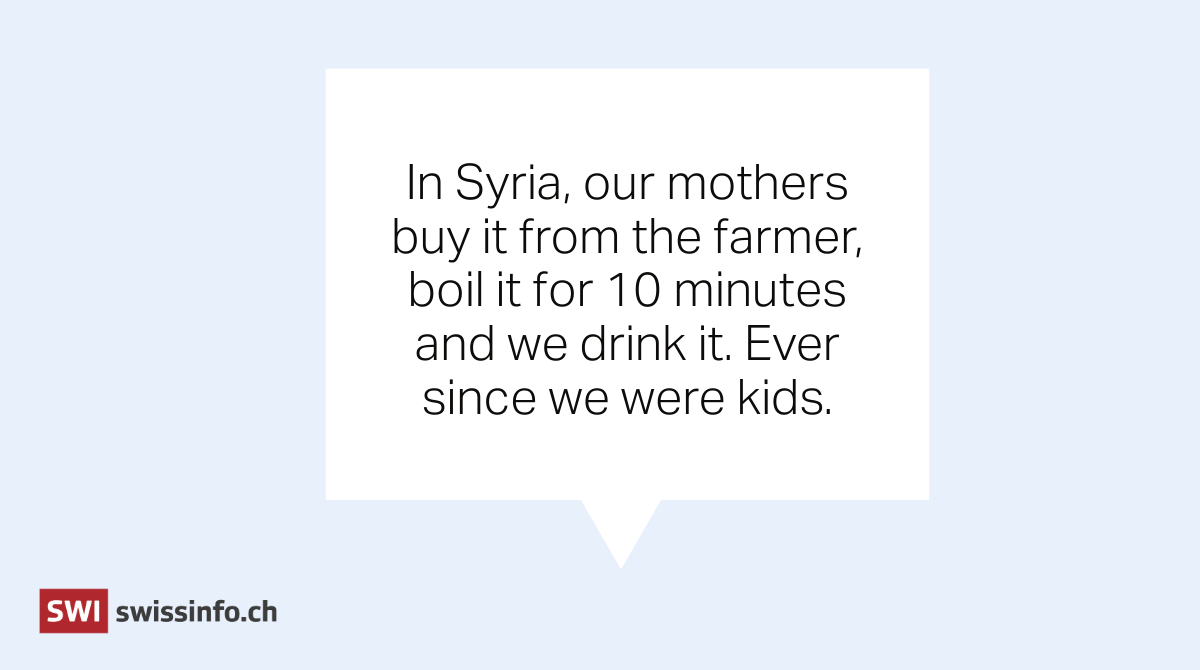
A 2022 analysisExternal link of the 2016 Food Safety Survey and 2019 Food Safety and Nutrition Survey conducted by the US Food and Drug Administration shows that about 4.4% of US adults consumed raw milk at least once in the past year. They were younger, living in a rural area, and in a state in which retail sale of raw milk is legal. A 2014 survey External linkof raw milk consumers in the Pacific Northwest by Oregon State University showed that taste (72%), perceived holistic health benefits (67%), support for local farms (60%), and disease prevention (50%) were the main reasons given for their preference.
“Returning freedom to Iowans is the reason for my efforts. The benefits and risks are all in the hands of the citizen, similar to what you describe in Switzerland,” says Iowa politician Schultz.
Risk versus reward
Despite its recent comeback research shows that raw milk can still pose risks to health. According to the US Centre for Disease Control, “drinking or eating products made from raw milk can expose people to germs such as Campylobacter, Cryptosporidium, E. coli, Listeria, Brucella, and Salmonella”. The US Food and Drug Administration, the Centers for Disease Control and organisations such as the American Academy of Pediatrics warn that raw milk is unsafe. In July, 165 Americans (mostly children) fell ill from a salmonella outbreak linked to one farm selling raw milk in California.
In Switzerland, the label on raw milk vending machines does not carry a warning on the risks of drinking it raw. Article 13 of the Federal law on Foodstuffs gives the government the power to impose special labelling requirements to signal “specific dangers”. This option has not been used to warn consumers about the risks of raw milk – at least not yet.
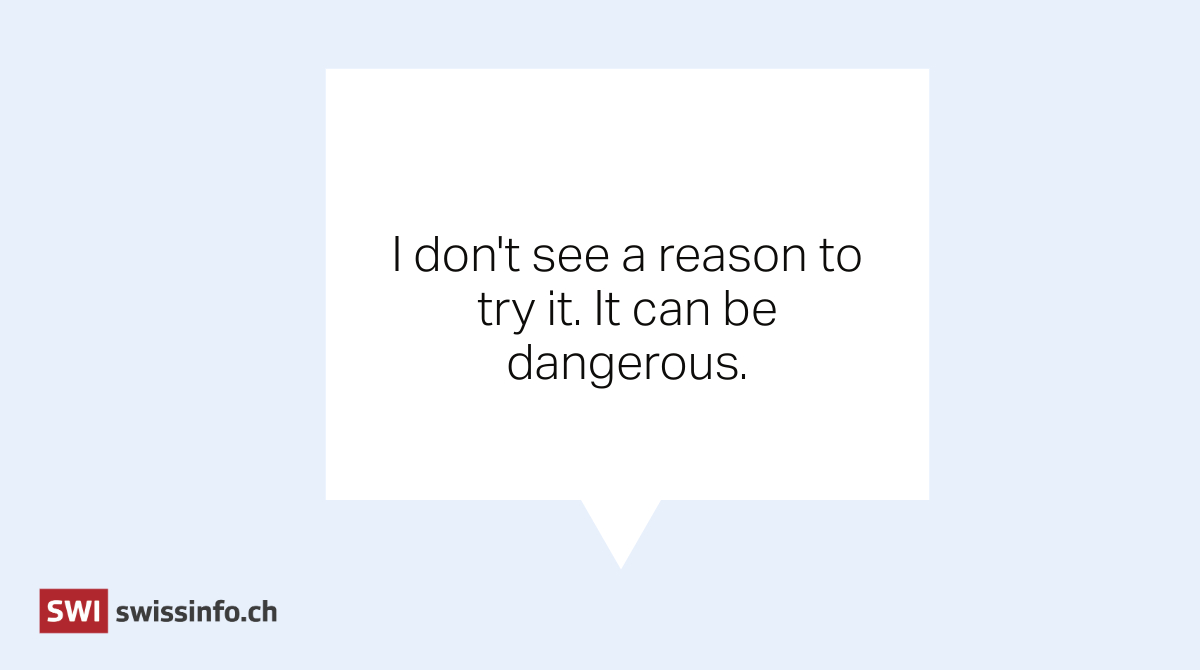
Besides dangerous bacteria, a new potential risk has appeared on the horizon: bird flu. In late March, highly pathogenic avian influenza was detected in US dairy cattle. Researchers detected External linkavian flu virus in 57.5% of 275 raw milk samples taken from herds in the four affected states with further testing revealing that a quarter of these contained infectious virus. A follow up study showed that pasteurisation killed all avian flu virus in raw milk artificially spiked with the virus.
“In Switzerland and Europe, there are currently no known cases of avian flu in cows. Consequently, we see no need at present to ban the sale of raw milk,” says the spokesperson of the Swiss Federal Food Safety and Veterinary Office.
However, the federal body’s own Institute of Immunology and Virology, in collaboration with Swiss agricultural research institute Agroscope, is currently assessing the possible risks associated with the presence of avian flu viruses in raw milk.
“If new scientific knowledge becomes available, we will take appropriate measures,” says the spokesperson.
Edited by Virginie Mangin
More

In compliance with the JTI standards
More: SWI swissinfo.ch certified by the Journalism Trust Initiative































You can find an overview of ongoing debates with our journalists here . Please join us!
If you want to start a conversation about a topic raised in this article or want to report factual errors, email us at english@swissinfo.ch.